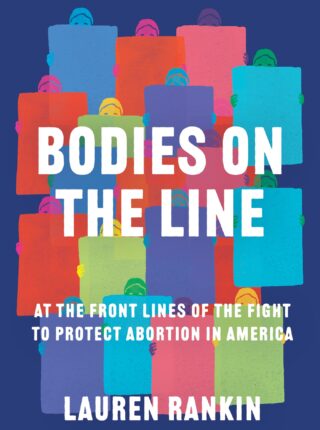Book Review: Bodies on the Line

The Carolina air is thick in August, even at 7 a.m. The humidity is a weight on my shoulders, smothering my face and making everything seem heavy. On this muggy summer morning, dressed in my rainbow vest, I sit outside my hometown’s only abortion clinic — putting my body on the line.
This summer has been fraught. Anti-abortion protesters have shifted from celebratory smugness to a profound and unsettling desperation. They’ll do anything to stop the people who travel out of state for abortion services in our little purple corner of the South. It’s not always easy to find joy in the face of such immense grief, but Lauren Rankin’s “Bodies on the Line” reminded me that this work is full of joy.
During slow clinic shifts, “Bodies on the Line” was my companion. I became enveloped in the stories Rankin uplifted — those of escorts, staff, providers, and patients. Few people, even among those who wear the vest, are aware of the long, storied history of clinic escorting and clinic defense.
While the practice of wearing vests is more recent, putting ourselves between anti-abortion extremists and people seeking healthcare is nothing new. Rankin takes readers through this history as told by the people there to witness it. She recounts harrowing tales of escorts going above and beyond, sneaking folks in through windows and rusty back gates to avoid blockades, reporting for duty at 3 a.m., and facing assassination and bomb threats.
The book traces clinic defenders’ stories during some of the most infamous bouts of violence, including the 1991 Summer of Mercy and the 1994 murders of clinic escort James Barrett and abortion provider Dr. John Britton. Rankin’s research fills an important gap in the history of the reproductive rights struggle: Clinic escorts have long been in the background making abortion access possible, even at high personal cost.
While some of the material in “Bodies on the Line” is heavy (I cried several times while reading), Rankin does not paint a picture of doom and gloom. It would be easy to take a quick look at the history of clinic escorts and see only pain: being shoved, punched, and choked by anti-abortion extremists.
Rankin brings to life the moments that only patients and escorts experience — moments that an outsider may deem mundane, but that are anything but. We hear from people whose abortion experiences were transformed or made more accessible through the care of clinic escorts.
We hear about the patients for whom a kind word or a paid Uber ride are transformative; the story of Dandy Barrett, daughter of James Barrett, linking arms with others to form a human shield around Planned Parenthood; families forming their own pseudo-escort teams to flank their loved one and safeguard them from harassment. After driving hours upon hours, patients finally finding refuge in a clinic escort’s smile.
Telling patients’ stories ethically, in a way that doesn’t feel voyeuristic or exploitative, is not an easy task, but it is one Rankin accomplishes beautifully. However, I found myself looking for the chapter on race and clinic escorting. It is no secret to anyone in the reproductive rights movements that, all too often, white feminists ignore the needs of the most marginalized, perpetuate harm, and replicate the harmful power structures of patriarchy.

Clinic escorting is not exempt or above this. White escorts like myself have acted as white saviors serving predominantly Black and Brown or impoverished communities without considering their input. The leadership of clinic escorting organizations across the country is glaringly white, and online discourse about this issue’s nature, severity, and solution abound. You do not have to scroll long on Twitter to find evidence of harm committed by “well-intentioned” white clinic escorts. Consequently, if I were to change Rankin’s work, I would add a chapter that explores the racial dynamics white escorts often wish to overlook. Choosing to shine a light on this aspect of our existence is painful but necessary, especially as we face new abortion bans.
Winter is coming, and the dynamics outside abortion providers are shifting; the air may cool, but anti-abortion extremists are just warming up. A fetal personhood case is on its way to the Supreme Court; eleven states and counting have enacted total bans on abortion with minimal exceptions, and it all changes daily. In times such as these, Rankin reminds us that ordinary people are the ones who have kept abortion accessible for this long, and it’s ordinary people who will continue to make abortion accessible in a post-Roe world.


